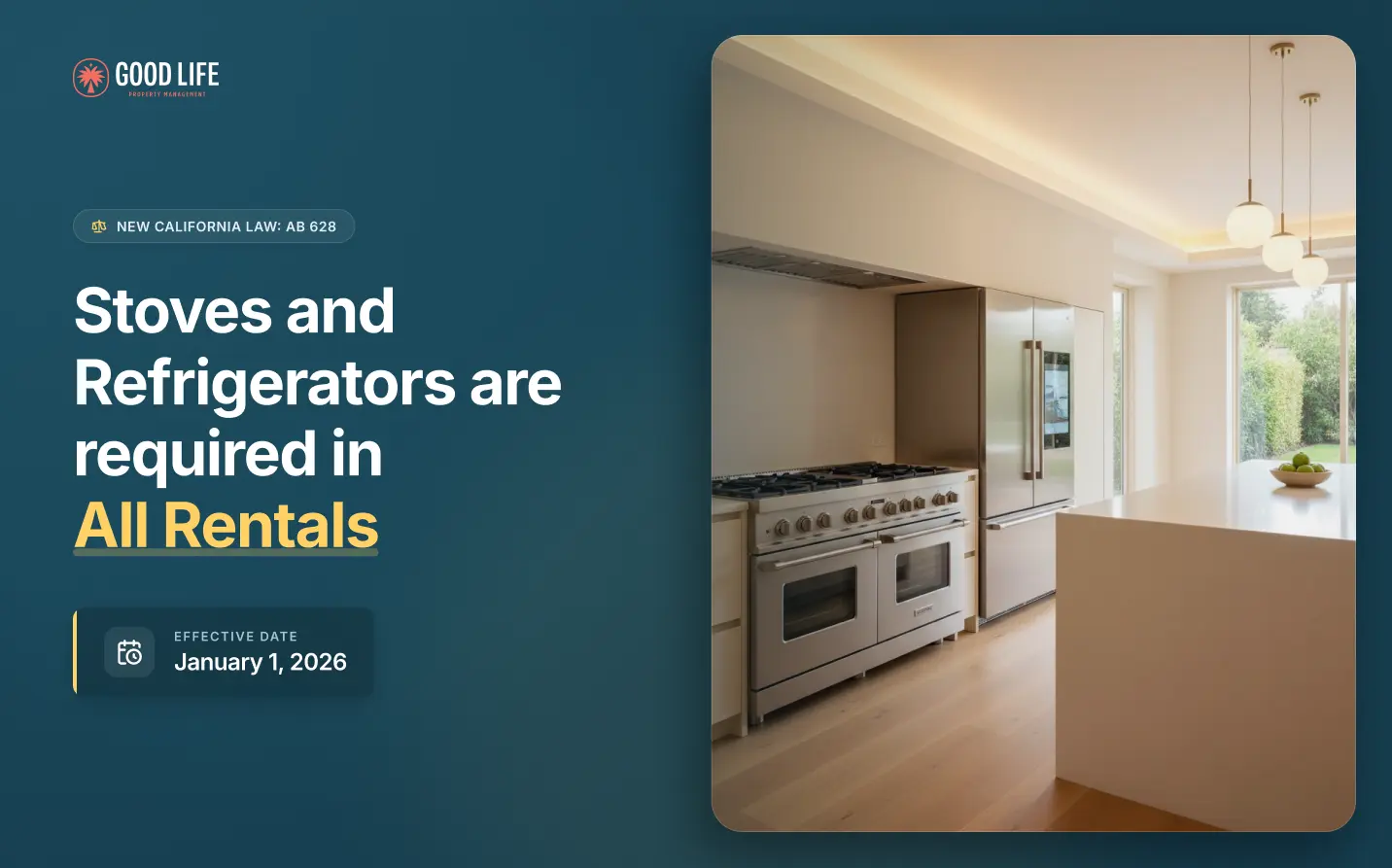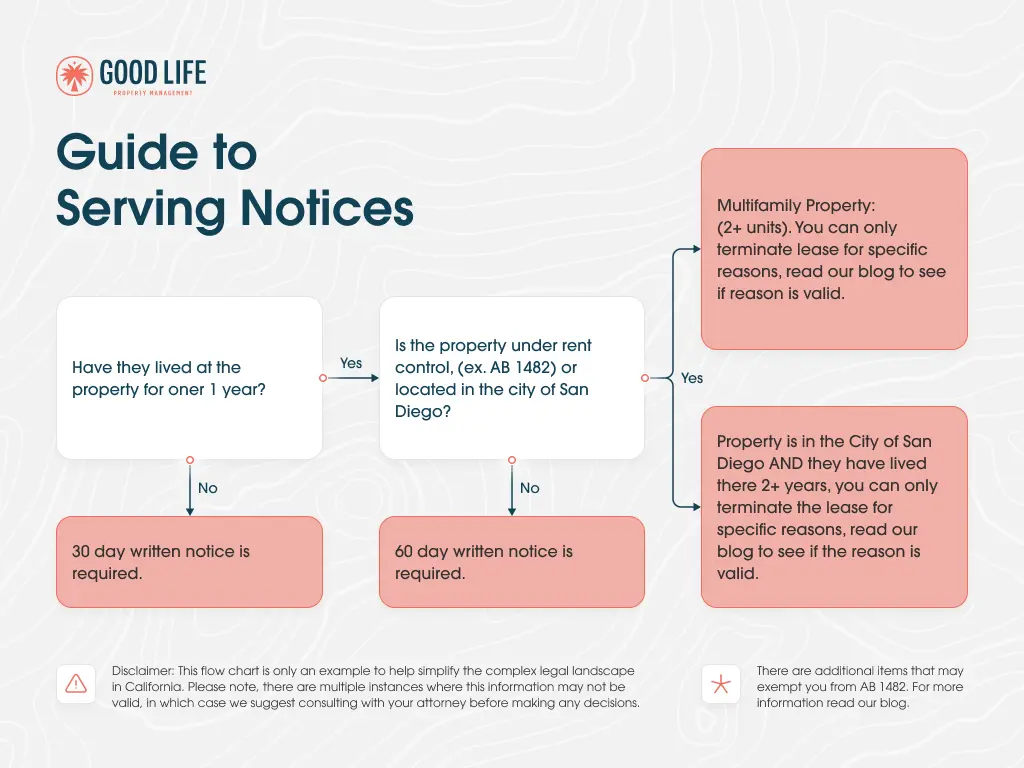What to do When Your Tenant Doesn't Pay Rent
Renting out property can be a lucrative venture. But when tenants fall behind on payments, it can quickly become a stressful and complicated ordeal. In this comprehensive guide, we’ll walk you through the steps to take when you tenant doesn’t pay rent.
Being a landlord in California can be financially rewarding, but it also comes with its own set of challenges, particularly when tenants fall behind on rent payments. Whether this is the first time you’ve experienced a late payment or you have a tenant with a long history of paying late, it can be a frustrating situation. The last thing a landlord wants to do is chase their tenant for rent owed.
Many landlords are unsure how to proceed when their tenant misses a payment. In this article, we’ll review the steps you can take when a tenant is not paying rent on time and if a tenant is not responding to your request for payment.
Table of Contents
Step 1: Refer to Your Lease
Step 2: Send a friendly reminder to your tenant
Step 3: Kindly ask your tenant why he or she is late on rent
Step 4: Serve a 3-day notice
Step 5: Offer a Cash for Keys trade
Step 6: Begin the eviction process
Step 7: Consider hiring a Property Manager
Important Things to Remember
Frequently Asked Questions
Step 1: Refer to Your Lease
Refer to your lease to determine when rent is due. Standard leases list the rent due date as the 1st of the month. Some leases offer a rent grace period. Even though California law does not require landlords to have a payment grace period, most landlords typically accept rent until the 4th of the month without penalty. If the fourth day falls on a weekend or holiday, the rent is due on the next business day. After that, you can charge a late fee.
According to California Civil Code Section 1671, landlords are allowed to charge late fees, but the fees must be reasonable and not excessive. The law does not place a limit on late rent payment fees, but the law implies that California landlords may only charge a reasonable estimate on what the late payment costs the landlord. Generally, a reasonable late fee is considered to be 5% to 10% of the total cost of rent. When determining the amount of your late fee in your lease, be sure you can justify it. In some communities, late fees are limited by local rent control ordinances.
If a tenant’s check bounces, the landlord can charge a reasonable fee, specified in the rental agreement. In California, this fee can include the bank’s charge and reasonable costs. Alternatively, the landlord can apply a service charge, up to $25 for the first insufficient funds check and up to $35 for each additional bounced check, as per the state’s Notice of Bad Check – Civil Code section 1719.
Step 2: Send a Friendly Reminder to Your Tenant
When rent is late, it doesn’t always mean your tenant is purposely behind. Sometimes tenants might genuinely forget to pay the rent or might have mailed the rent check on the due date, causing it to arrive a few days later. To maintain good rapport, start by sending a friendly reminder. A quick message, whether through email or a text, can straighten out the situation. This is especially important if your tenant is usually on time with payments.
If your tenant still has not paid rent after your reminder, then keep reading for next steps.
Step 3: Kindly Ask Your Tenant Why He or She is Late on Rent
Sometimes, tenants face tough financial times, and these challenges might be temporary. Allowing an additional, unofficial grace period can provide tenants with the opportunity to catch up on overdue rent and resume regular payments. Although a rent grace period is not required by California law, this approach allows for a more compassionate response to short-term challenges.
On the other hand, serious issues such as health crises or job loss in a challenging market can create prolonged financial strain for the tenant. Therefore, when considering a rent grace period, consider the potential costs of eviction and vacancy against the uncertainty of recovering lost rent within a reasonable timeframe.
Important note: While talking to your tenant to find out what’s going on, keep communication at a minimum. Excessive contact can be perceived as harassment, which can lead to legal consequences for you.
Step 4: Serve a 3-Day Notice
If you have completed the aforementioned steps and still have not received the rent, it’s time to serve an initial notice. This notice, called a 3-Day Notice to Pay Rent or Quit, gives the tenant three days to pay rent. This is the first legal step required before you can move forward with an eviction.
According to the California Courts Self-Help Guide:
The Notice must be in writing and include:
- The tenant(s) full name(s)
- The rental home address
- Exactly how much rent is owed
- That all the past due rent must be paid within 3 days or you must move out
- The name, address, and telephone number of the person to whom rent is due
- If you can pay in person, the days and times you can pay the rent and the address where you can pay it
- If you can pay by mail, the Notice must give the address where you can mail the payment
How to Report Money Owned When Tenant Doesn't Pay Rent
Your 3-day Notice to Pay or Quit can only include past due rent. If you include late fees, bounced check fees, or utilities, then the Notice is not valid in court.
How to Figure out 3-Day Notice Deadline
To determine your tenant’s 3-day Notice to Pay or Quit deadline, start counting the first weekday after the notice is delivered. According to California Court rules, you must exclude Saturdays, Sundays, and court holidays in your Notice.
How to Deliver a 3-Day Notice to Pay or Quit in California
After you write the appropriate Notice with all necessary requirements, you must serve it to the tenant. California courts allows three options to serve tenants:
- Hand deliver the Notice to the tenant.
- Give the Notice to an adult who will give the Notice to the tenant and mail a copy of the Notice.
- Post the Notice on the home where the tenant lives and mail a copy of the Notice.
Be sure to conform to all the service requirements, such as mailing the Notice on the same day of posting the Notice. Make a copy of the Notice for your records and fill out a proof of service. This will be important to record if the case escalates to court.

Step 5: Cash for Keys
As a last ditch effort, you can offer your tenant a Cash for Keys exchange. While you may think it’s better to file an eviction to get it on the tenant’s record, the formal eviction process can take 3-6 months to finalize. This can mean 3-6 months of no income from your rental property.
The terms of a Cash for Keys deal is up to you. Anecdotal reports from those who have experience with “cash for keys” programs report that $500 is generally the minimum offered to tenants, while $5,000 is generally the maximum.
Once the tenant has exceeded the 3-day notice period, you can reach out one final time to negotiate. In exchange for the rent owed and keys to the property, you will not file an eviction. Make sure you give them a hard deadline and once it’s passed, file the eviction.
Step 6: Begin the Eviction Process
Once the 3-day deadline has passed, you can proceed with the eviction. The first step is to contact your attorney and have them file an unlawful detainer with the court. Gather all necessary documents, which include the following:
- The lease or rental agreement and any written changes the tenant agreed to
- The notice you gave your tenant
- Written proof your tenant was given the notice
- The tenant’s rental application
- The tenant’s ledger
- Any other important communications the attorney should be aware of
Then, you will need to fill out the following court forms:
Once the Summons & Complaint is filed with the court and you “Serve the Papers” to the tenant, you will wait for your tenant’s response.
Effective January 1, 2025, AB 2347 extends the period tenants have to respond to an Unlawful Detainer Summons from 5 business days to 10 business days. The tenant has 10 business days—minus Saturdays, Sundays, and Court Holidays—to submit their Answer. This additional time requires landlords to account for longer timelines in the eviction process.
If the tenant does not respond after 10 days, you can request a default judgement.
If the default judgement is approved, the judge will order the tenant to pay court costs and attorney fees. Five to 14 days later, you will receive a Writ of Possession, which instructs the sheriff to lock the tenant out of the property. The sheriff will visit the property and notify the tenant that they must be out in five days. If they are not, they will be forcibly removed.
If the tenant intends to fight the eviction, you will be assigned a court date. The judge will hear both sides and make a decision. If the judge sides with the tenant, the tenant will be allowed to remain in your property. If you win, the tenant will be required to vacate the property.
A Writ of Possession will be issued if you win the case. The sheriff will post this notice to the tenant five to 15 days after judgment, and the sheriff lockout will occur approximately one week later. You are expected to meet the sheriff for the lockout and hire a locksmith, who will change the locks so the tenant cannot access the property.
The judge will likely order your tenant to pay back rent, damages, penalties, and costs (attorney and court fees) related to the case. However, if your tenant wins, you could be required to pay their trial-related costs.
If the tenant moves out or you come to an agreement, then the court case is dismissed
If your tenant moves out or you two come to an amicable agreement, you can file forms to dismiss the eviction case.
Step 7: Consider Hiring a Property Manager
Handling tenants who refuse to pay rent and going through an eviction process can be a traumatic and discouraging experience. But don’t get disheartened with your rental property business. Instead, consider hiring a reliable property manager with a No Eviction Guarantee.
At Good Life Property Management, our No Eviction Guarantee is simple: if we have to evict a tenant we placed for not paying rent, we’ll cover the eviction costs, up to $1200. This usually includes all court fees and attorney expenses. Plus, we’ll find a new tenant for free, making sure your rental property stays profitable and hassle-free.

Important Things to Remember When Tenant Doesn't Pay Rent
It’s essential to act promptly and firmly when rent is overdue. While sending reminders is polite, it’s crucial to stick to your policies, like enforcing late fees or proceeding with eviction if needed. Striking a balance between understanding and firmness ensures tenants respect the rules. Giving your tenants too much leeway, however, can result in them not respecting your rules.
Document everything in writing, especially agreements with tenants. Both parties should sign a detailed document, preventing misunderstandings and offering a clear record of the agreed terms.
If there’s a co-signer, remember they’re equally responsible. Therefore, you should include them in legal processes and documentations. The co-signer on the lease is a responsible party in the eviction case and should be named in any lawsuits and documents.
Consulting with your attorney is wise to stay informed about local laws. Our chart below provides a quick guide for serving notices at your property. Keeping these steps in mind will help you handle late rent situations effectively and within legal bounds.
For more information on rent control and just cause eviction in California, check out our full blog post on AB 1482.
FAQs
California law does not require a grace period for rent.
Under California law, a late fee will only be enforced if the fee is a reasonable estimate of the amount that the late payment will cost the landlord. The language must be included in the lease. California does not have a law specifying how much you can charge for a late fee, but we typically recommend 5 to 7% of the rent.
Reach out to the tenant to notify them. California allows landlords to charge $25 for the first bounced check and $35 for each additional bounced check.
It’s up to you, but remember to treat all tenants the same. If you change your policy, send a notice to everyone stating you no longer accept partial payments. We do not recommend accepting less than half the rent.
Resources
Steve Welty
Subscribe to our Weekly Newsletter
Join the 5k+ homeowners receiving Local Law Updates and Landlord Tips. Delivered to your inbox every Saturday at 6am PST.
Share this:
Get in touch with us:
We make owning rental property easy.

Pro Services
Tired of headaches?
We got you covered.
Choose Your Next Step
Good Life Blogs
We believe that education is empowering.

The 2026 Appliance Mandate: How AB 628 Affects Landlords
Learn how CA’s 2026 Appliance Mandate (AB 628) changes landlord obligations, what appliances must be provided, and steps to take to stay compliant.

San Diego Landlord Insurance: Requirements & Best Policies
Discover everything you need to know about landlord insurance San Diego. Learn coverage types, requirements, and get tips for protecting your rental property.

The 6 Best Places To Post Rental Property For Free
Wondering where to post rental property for free? Discover the top 6 sites to list your rental and attract quality tenants without spending a dime.
